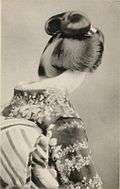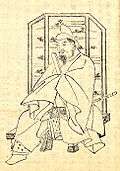Definify.com
Definition 2025
天神
天神
Chinese
| day; sky; heaven | God; unusual; mysterious; soul; spirit; divine essence; lively; spiritual being
|
||
|---|---|---|---|
|
simp. and trad. (天神) |
天 | 神 | |
Noun
天神
Japanese
| Kanji in this term | |
|---|---|
| 天 | 神 |
|
てん Grade: 1 |
じん Grade: 3 |
| on'yomi | |
Etymology 1
From Sinitic 天神. Date of borrowing unknown. Compare modern Mandarin 天神 (tiānshén, “god, godhead, divinity”).
Pronunciation
Usage notes
Less commonly read using the kan'on reading tenshin: [tẽ̞ɴɕĩɴ][2][3]
Noun

天神: an umeboshi

天神: the hairstyle
天神 (hiragana てんじん, romaji Tenjin)
- (mythology, Shintō): the Japanese gods of the heavens
- a noble wearing ordinary robes (robes not dyed to match the wearer's rank)
- an umeboshi (from the way that Sugawara no Michizane (see Proper noun below) was very fond of ume)
- an umeboshi pit
- short for 天神髷 (tenjin mage) or 天神結び (tenjin musubi), a certain kind of bow-shaped topknot or bun hairstyle worn by women, popular in the late 1800s
Synonyms
- (gods): 天つ神 (あまつかみ, ama tsu kami)
- (umeboshi): 梅干し (うめぼし, umeboshi)
- (hairstyle): 天神髷 (てんじんまげ, tenjin mage)
- (hairstyle): 天神結び (てんじんむすび, tenjin musubi)
Derived terms
Derived terms
External links
-
 天神 (Tenjin; disambig page) on the Japanese Wikipedia.Wikipedia ja
天神 (Tenjin; disambig page) on the Japanese Wikipedia.Wikipedia ja
-
 Tenjin (disambig page) on Wikipedia.Wikipedia
Tenjin (disambig page) on Wikipedia.Wikipedia
-
 梅干し (Umeboshi) on the Japanese Wikipedia.Wikipedia ja
梅干し (Umeboshi) on the Japanese Wikipedia.Wikipedia ja
-
 Umeboshi on Wikipedia.Wikipedia
Umeboshi on Wikipedia.Wikipedia
Proper noun

天神: Sugawara no Michizane

天神: Tenjin-san, the Tenman-gū shrine to Sugawara no Michizane in Kitano

天神: Tenjin Station in downtown Fukuoka
天神 (hiragana てんじん, romaji Tenjin)
- the Shinto kami of scholarship, the deification of Sugawara no Michizane (845-903 CE), a scholar, poet, and politician
- a shrine dedicated to Sugawara no Michizane
- one of the traditional Noh masks, depicting one of the 鬼神 (onigami; kijin, “fierce gods”) as the vengeful spirit of Sugawara no Michizane, the lead role in the 雷電 (Raiden) piece
- an area in downtown Fukuoka
Synonyms
- (shrine): 天満宮 (てんまんぐう, Tenman-gū)
Derived terms
Derived terms
|
External links
-
 菅原道真 (Sugawara no Michizane) on the Japanese Wikipedia.Wikipedia ja
菅原道真 (Sugawara no Michizane) on the Japanese Wikipedia.Wikipedia ja
-
 Sugawara no Michizane on Wikipedia.Wikipedia
Sugawara no Michizane on Wikipedia.Wikipedia
-
 天神 (福岡市) (Tenjin, Fukuoka) on the Japanese Wikipedia.Wikipedia ja
天神 (福岡市) (Tenjin, Fukuoka) on the Japanese Wikipedia.Wikipedia ja
-
 Tenjin, Fukuoka on Wikipedia.Wikipedia
Tenjin, Fukuoka on Wikipedia.Wikipedia
-
 福岡市 (Fukuoka City) on the Japanese Wikipedia.Wikipedia ja
福岡市 (Fukuoka City) on the Japanese Wikipedia.Wikipedia ja
-
 Fukuoka on Wikipedia.Wikipedia
Fukuoka on Wikipedia.Wikipedia
Etymology 2
Phrase consisting of 天 (ama, “the heavens”) + つ (tsu, Old Japanese possessive particle) + 神 (kami, “god, gods”).[2][3]
More commonly written with the tsu explicitly spelled out in hiragana, as 天つ神.
Pronunciation
Alternative forms
- 天つ神, 天津神
Noun
天神 (hiragana あまつかみ, romaji ama tsu kami)
Coordinate terms
Coordinate terms
External links
-
 天津神・国津神 (Ama tsu kami, kuni tsu kami) on the Japanese Wikipedia.Wikipedia ja Gives an overview of both groups.
天津神・国津神 (Ama tsu kami, kuni tsu kami) on the Japanese Wikipedia.Wikipedia ja Gives an overview of both groups. -
 List_of_divinities_in_Japanese_mythology#Shinto on Wikipedia.Wikipedia Does not distinguish between ama tsu kami and kuni tsu kami.
List_of_divinities_in_Japanese_mythology#Shinto on Wikipedia.Wikipedia Does not distinguish between ama tsu kami and kuni tsu kami.
References
- ↑ 1998, NHK日本語発音アクセント辞典 (NHK Japanese Pronunciation Accent Dictionary) (in Japanese), Tōkyō: NHK, ISBN 978-4-14-011112-3
- 1 2 1988, 国語大辞典(新装版) (Kokugo Dai Jiten, Revised Edition) (in Japanese), Tōkyō: Shogakukan
- 1 2 2006, 大辞林 (Daijirin), Third Edition (in Japanese), Tōkyō: Sanseidō, ISBN 4-385-13905-9